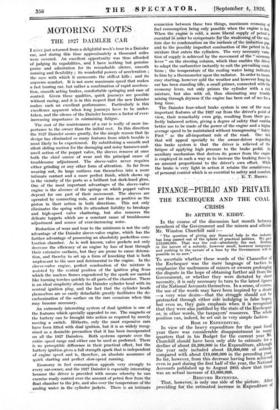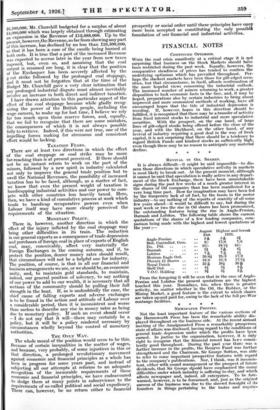FINANCE-PUBLIC AND PRIVATE
THE EXCHEQUER AND THE COAL -CRISIS
BY ARTHUR W. KIDDY.
In the course- of the discussion last month between member i of the Government and the miners and officials Mr. Winston Churchill said :— "The question of giving_ any financial help to the industry has long-passed out of the sphere of practical politics. We gave 03,000,000. That was the end—absolutely the end. Nothing in the nature of a subsidy, however small, however temporary. and nothing in the nature of a loan by the Government will be possible to us now."
To ascertain whether these words of the Chancellor of the Exchequer was the mere language of tactics to emphasize the uselessness of miners or owners prolonging the dispute in the hope of obtaining further aid from the Government, or whether they were dictated by sheer necessity, it is only necessary to turn to the latest figures of the National Accounts themselves. In a sense, of course, the use of the words may have been inspired by a desire —a very wise desire—that the struggle should not be protracted through either side'indulging in false hopes, but even so, they gain emphasis when it is recognized that they were also justified by the state of the Exchequer or, in other words, the taxpayers' resources. The whole position can, indeed, be set out in very simple fashion.
RISE IN EXPENDITURE.
In view of the heavy expenditure for the past fiscal year there was considerable disappointment in mug quarters that in his Budget for the current year Mr. Churchill should have been only able to estimate for a decline of about £6,500,000 in the Expenditure, although the year only included about £3,000,000 of subisdy compared with about £19,000,000 in the preceding year. So far, however, from this decrease having been achieved even in part during the first half Of the year, the National Accounts published up to August 28th show that there was an actual increase of £5,000,000.
- REDUCED REVENUES.
That, however, is only one side of the picture. After providing for the estimated increase in .Expenditure of £6,500,000, Mr. Churchill budgeted for a surplus of about £4,000,000 which was largely obtained through estimating an expansion in the Revenue of £12,688,000. III) to the resent however,the Revenue, so far from showing any part of this increase, has declined by no less than /26,500,000, so that it has been a case of the candle being burned" at both ends. It is true that a part of the increased Revenue was expected to accrue later in the- year from new taxes imposed, but, even so, and assuming that the coal output is resumed ere long, it is clear that the position of the Exchequer has been--severely affected by the g eat strike followed_ by the prolonged coal stoppage, and it must not be forgotten that at the time of the Budget Mr. Churchill gave a very clear intimation that any prolonged industrial dispute must almost inevitably involve an increase in both direct and indirect taxation.
I have drawn attention to this particular aspect of the effect of the coal stoppage because while gladly recog- nizing the power of the British people, including the wage earners, to make up for lost time, I believe we rely far too much upon those reserve forces, and, equally, that we fail to recognize that there are some mistakes, the consequences of which it is not always possible fully to retrieve. Indeed, if this were not true, one of the impelling forces making for strenuous and consistent effort would be lacking.
TAXATION FEARS.
There are at least two directions in which the effect of the coal stoppage or coal strike may be more far-reaching than is at present perceived. If there should not be an instant return to work on the part of the miners, followed by a new spirit in industry calculated not only to improve the general trade position but to swell the National Revenues, the possibility of increased taxation has to be faced, although, as a matter of fact, we know that even the present weight of taxation is handicapping industrial activities and our power to com- pete with other countries less heavily taxed. Here, then, we have a kind of cumulative process at work which tends to handicap recuperative powers even when Labour itself may have more clearly perceived the requirements of the situation.
MONETARY POLICY.
There is, however, another direction in which the effect of the injury inflicted by the coal stoppage may bring other difficulties in its train. The reduction in our general exports as a consequence of trade depression and purchases of foreign coal in place of exports of English coal, may, conceivably, affect very materially the Foreign Exchanges in the coming autumn, and if, to protect the position, dearer money rates should result, that circumstance will not be a helpful one for industry. The position, of course, is that in all our financial and business arrangements we are, or we should be, an economic unity, and, to maintain gold standards, to maintain, indeed, our general position of solvency, to say nothing of our power to add to our wealth, it is necessary that all sections of the community should be pulling their full strength in the boat. If, as is undoubtedly the case, the chief cause of falling exports and adverse exchanges is to be found in the action and attitude of Labour over a considerable period, then it is inconsistent and worse than useless to describe any rise in money rates as being due to monetary policy. If such an event should occur —I do not say that it will—there may certainly be a policy, but it will be a policy rendered necessary by circumstances wholly beyond the control of monetary authorities.
THE ONLY WAY.
The whole moral of the position would seem to be this. Because of certain inequalities in the matter of wages, and because, very probably, of some injustices in this or that direction, a prolonged revolutionary movement against economic and financial principles as a whole has been in progress for some years past, and instead of subjecting all our attempts at reforms to an adequate recognition of the inexorable requirements of these economic and financial principles, we have endeavoured to dodge them at many points in subservience to the requirements of so-called political and social expediency. There can, however, be no return either to financial prosperity or social order until these principles have onc more been accepted as constituting the only possible foundation of our financial and industrial activities.



































 Previous page
Previous page